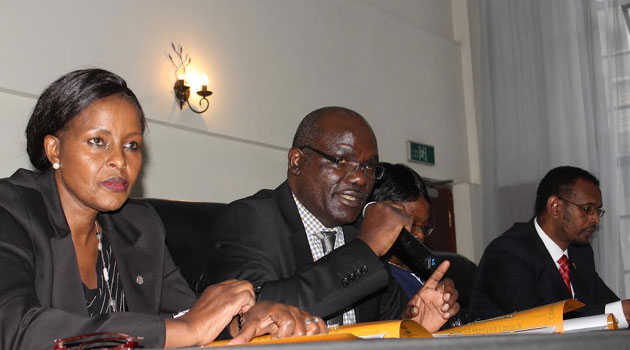
Having heard all the submissions, the bench comprising Milton Makhandia, Patrick Kiage, Agnes Murgor, William Ouko and Kathurima M’Inoti will deliver its judgment on June 23/FILE
NAIROBI, Kenya, Jun 7 – The Court of Appeal on Wednesday concluded hearing the Independent Electoral and Boundaries Commission’s challenge to the declaration of the presidential election result by the constituency returning officers, as opposed to the IEBC Chairman.
The court concluded hearing of the appeal after taking submissions from the Coalition for Reforms and Democracy – that wants it dismissed – followed by final submissions from the IEBC in response to the issues raised by CORD and the other respondents – Maina Kiai, Khelef Khalifa and Tirop Kitur.
CORD, represented by Siaya Senator James Orengo, former Ombudsman Otiende Amollo and Paul Mwangi worked to counter arguments made by the IEBC in its submissions on Tuesday.
Amollo addressed himself to IEBC’s submission that the High Court lacked the jurisdiction to make the decree that the constituency returning officers’ announcement of the presidential election results should be final, as it was a matter that should have properly been before the Supreme Court.
In his submissions, Amollo countered – with the support of the Katiba Institute’s Waikwa Wanyoike (amicus curiae) – that the High Court was rightly seized of the matter as it did not call the validity of the presidential election into question but sought an interpretation of a legal provision.
Wanyoike also sought to make the point that at the time the dispute was placed before the High Court for determination, the IEBC had yet to give notice, in The Kenya Gazette, that an election of the President of the Republic of Kenya would be held on August 8 – notice it gave on March 17, the High Court case having been filed on May 23, 2016.
In its response, made by Wambua Kilonzo, the IEBC was however insistent that once that notice was published, “the landscape changed… period!” and the High Court erred in going ahead to determine the matter.
Even if that were the case, Wanyoike submitted, then it would be a question of shared jurisdiction between the two superior courts given, “the question of jurisdiction arises when the dispute arises,” and he was of the opinion that the High Court did not lose its jurisdiction when the notice was published.
Amendments to the contentious section 39 of the Elections Act were also brought up by Amollo who differed with Kilonzo on which between the appeal and the High Court judgement, it rendered moot.
Mwangi on his part dealt with the question of human error which IEBC lawyer Paul Nyamodi raised on Tuesday querying why the Commission would recruit incompetent officers and submitting that presidential election result would be less vulnerable to alteration in the hands of a constituency returning officer in the presence of observers and agents, “of more than just the presidential candidates,” than it would be in the hands of the IEBC Chairperson.
“Your lordships do not give this power to the IEBC Chair,” Mwangi submitted adding that any changes made by his hand would be arbitrary in nature given the absence of regulations governing the said “correction.”
“The chairman sits in a room surrounded by the security chiefs, can you imagine how difficult it would then be to declare their boss loser in such an intimidating environment and essentially fire them all? That is why it’s important that the option to change the results to suit the situation should be near impossible outside a court of law,” he submitted.
Having heard all the submissions, the bench comprising Milton Makhandia, Patrick Kiage, Agnes Murgor, William Ouko and Kathurima M’Inoti will deliver its judgment on June 23.









































